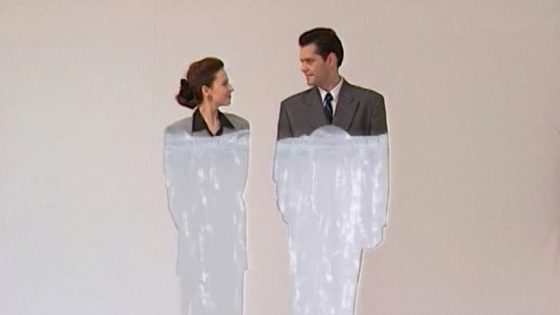“Mad Men” did much to romanticize the art of the ad agency, with many of the series’ most memorable scenes in thrall to the creative and strategic genius that goes into a successful sell. Not all advertising is quite so elaborately or expensively conceived, though as “Eight Postcards From Utopia” makes clear, even the most utilitarian or workmanlike commercials have a cultural value of their own. Assembled wholly from a vast archive of post-Revolution Romanian TV ads, Radu Jude and Christian Ferencz-Flatz’s witty, chaotic documentary carves out a tumultuous 30-year-plus history of a country transitioning from socialism to capitalism — all via the ways in which everything from beer to laundry detergent to banking is pitched to the viewing public.
Ostensibly experimental in form but straightforward in concept, “Eight Postcards From Utopia” is presented as a “found-footage” film in the truest sense of the term — with these vintage ads, often on grainy video stock, giving little sense of having been preserved with much care or consideration of future scrutiny. Teaming with Bucharest-based philosopher Ferencz-Flatz, currently working on a research project dedicated specifically to post-socialist advertising, firebrand auteur Jude takes a more rhetorically passive approach here than in his spikier fiction work. There is no narration or secondary commentary to contextualize the clips, beyond the nine chapter headings (the eight postcards of the title, plus an epilogue) that roughly divide this torrent of content into (frequently overlapping) thematic strands.
Viewers are left to parse the implications of how the filmmakers and Jude’s regular editor Cătălin Cristuțiu have sequenced and spliced these banal flashes from an aspirational past: Some connections are blatant, others oblique, though there’s consistent pleasure in puzzling them out. That curiosity factor, plus a high degree of how-we-lived-then comedy in the selections themselves, ought to make the short, digestible “Eight Postcards” a favorite of festival programmers beyond Locarno. In distribution terms, however, it may be better suited to specialist streaming platforms — not altogether inappropriate for a work that can feel like a very addled dive down the YouTube rabbit hole. (The film was presented at Locarno as a double bill with Jude’s “Sleep #2,” a hypnotic, hour-long observation of year-round goings-on at Andy Warhol’s gravesite in Pittsburgh; the two aren’t formally sibling works, though they pair well as a dual reflection on cycles of popular culture and nostalgia.)
“What belongs to all belongs to no one,” declares one ad in the film’s opening chapter, “The Romanian Paradox.” It’s a slogan that, depending on context, could either be read as an idyllic promise or a threat regarding communal ways of living — here, as with a 1995 PSA proudly announcing “the biggest privatization program in Romanian history,” it’s a indicative of a country that, having just shed its status as a socialist republic, is eager to sell its population on the possibilities of personal wealth.
To this end, overtly political ads mix with consumer commercials that conflate individual empowerment with national pride, skipping over recent history to the ancient past. “Long live the Imperial party,” brags a spot for Imperial vodka, its wordplay alluding not to a progressive future but the brawny hedonism of Roman Dacia, while other ads comparably revel in ennobling gladiatorial iconography, even if it’s just for Pepsi. A beer ad takes a different approach, putting a positive spin on national hardships by promising a taste “as intense as life in Romania” — not a drink, nor a country, for wimps.
This macho posturing recurs through many of the film’s other chapters, though is most specifically gendered in “Masculine Feminine,” which exposes the predominantly patriarchal perspective of capitalism. Even ads expressly targeted at women have a misogynistic tilt, from the leering pan over uniformly lithe female legs in a spot for pantihose to the dutiful feminine domesticity limned in sundry detergent ads. (One queer-tinged exception, in a short chapter titled “Magique Mirage,” sees a male sailor approvingly checking out his shipmate’s fluorescent white bottoms: Only straight Romanian men, it seems, are exempt from the lure of Ajax.)
A complementary chapter, “The Ages of Man,” outlines the Romanian male condition as viewed by advertisers in tones ranging from taunting to sympathetic. In contrast to a recruitment effort from the Ministry of Defense that hawks a violent masculine ideal, a realtor-agency ad portrays a young man caught in flagrante with his girlfriend by his mother — highlighting the emasculating reality for many young men who can’t afford to leave home. The economic rewards and pitfalls of life in post-socialist Romania are most directly addressed in the section “Money Talks” — while one lottery-company ad invites viewers to “get ready to be rich,” another sees a woman having recently earned 12.5 million leu stating her intent to deposit her fortune in the Romanian Investment Fund. What belongs to all belongs to no one, indeed.
Only a concluding epilogue, “The Green Apocalypse,” feels half-baked, gesturing to the environmental crisis via high-kitsch advertising images of Romania’s natural landscape — a sequence that would work better placed interstitially than as a soft conclusion to such a vibrantly anarchic work. Still, “Eight Postcards From Utopia” lingers in the mind as a sharp sociopolitical tangram that could be assembled any number of ways to differing academic and emotional effect: a vision of rebuilding or destruction, hope or nihilistic collapse, depending on what you’re willing to buy.
Source Agencies


